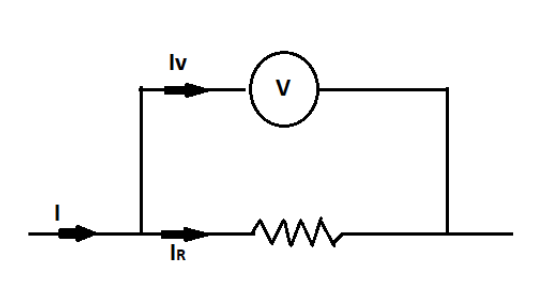
The resistance of an ideal voltmeter is:
A. Zero
B. Infinity
C. $1000\Omega $
D. $10000\Omega $
Answer
605.7k+ views
Hint: In this question, we first need to know that voltmeters are always connected in parallel across the branch for which potential is to be measured. And to obtain an accurate reading the potential drop across the voltmeter should be zero that is its internal resistance must be infinite.
Complete Step-by-Step solution:
A voltmeter is a scientific instrument used for measuring the voltage or the electric potential difference between two points in an electronics or electric circuit. There can be two types of a voltmeter that is an analog voltmeter and digital voltmeter.
A voltmeter is always connected in parallel across the branch for which voltage is to be found as shown in figure 1.

Let us assume that the main current is $I$ and it is getting divided into ${I_V}$ that is the current in the voltmeter and ${I_R}$ that is the current in the branch for which we have to measure the potential.
So the voltmeter will read the potential difference across the branch as well as across itself due to the current ${I_V}$. This results in inaccuracy in the measured values which is undesirable.
To ensure the accuracy of the voltmeter we need that there should not be any potential drop across the voltmeter. This can be achieved if the current ${I_V}$ is zero, that is the resistance of the voltmeter must be very high.
Therefore for an ideal voltmeter, the internal resistance should be infinite. Hence option B is correct.
Note: For these types of questions we need to know why a voltmeter and ammeters are used. Then we need to know how they are connected, that is a voltmeter is connected in parallel to the required branch whereas an ammeter is connected in series with the required branch. After that, we need to understand that the internal resistance for an ammeter should be zero whereas a voltmeter should be infinity.
Complete Step-by-Step solution:
A voltmeter is a scientific instrument used for measuring the voltage or the electric potential difference between two points in an electronics or electric circuit. There can be two types of a voltmeter that is an analog voltmeter and digital voltmeter.
A voltmeter is always connected in parallel across the branch for which voltage is to be found as shown in figure 1.

Figure1
Let us assume that the main current is $I$ and it is getting divided into ${I_V}$ that is the current in the voltmeter and ${I_R}$ that is the current in the branch for which we have to measure the potential.
So the voltmeter will read the potential difference across the branch as well as across itself due to the current ${I_V}$. This results in inaccuracy in the measured values which is undesirable.
To ensure the accuracy of the voltmeter we need that there should not be any potential drop across the voltmeter. This can be achieved if the current ${I_V}$ is zero, that is the resistance of the voltmeter must be very high.
Therefore for an ideal voltmeter, the internal resistance should be infinite. Hence option B is correct.
Note: For these types of questions we need to know why a voltmeter and ammeters are used. Then we need to know how they are connected, that is a voltmeter is connected in parallel to the required branch whereas an ammeter is connected in series with the required branch. After that, we need to understand that the internal resistance for an ammeter should be zero whereas a voltmeter should be infinity.
Recently Updated Pages
Master Class 10 Computer Science: Engaging Questions & Answers for Success

Master Class 10 General Knowledge: Engaging Questions & Answers for Success

Master Class 10 English: Engaging Questions & Answers for Success

Master Class 10 Social Science: Engaging Questions & Answers for Success

Master Class 10 Maths: Engaging Questions & Answers for Success

Master Class 10 Science: Engaging Questions & Answers for Success

Trending doubts
What is the median of the first 10 natural numbers class 10 maths CBSE

Which women's tennis player has 24 Grand Slam singles titles?

Who is the Brand Ambassador of Incredible India?

Why is there a time difference of about 5 hours between class 10 social science CBSE

Write a letter to the principal requesting him to grant class 10 english CBSE

A moving boat is observed from the top of a 150 m high class 10 maths CBSE




